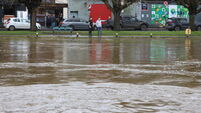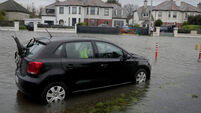Spain forced to take emergency action as temperatures reach 38C

A woman shelters from the sun in Madrid last summer. Last week, Europe’s leading scientists warned “alarming” climate change will lead to heatwaves becoming longer and heat stress threatening lives, after the continent’s warmest ever recorded summer. Photo: AP/Manu Fernandez
Spain is sweltering in summertime temperatures — with highs of 38 degrees centigrade in the southern Guadalquivir Valley — the country's national weather service said.
Health officials are considering bringing in a heat prevention plan two weeks early to help regions respond to the unseasonably warm weather's effects.
Check out the Irish Examiner's WEATHER CENTRE for regularly updated short and long range forecasts wherever you are.














